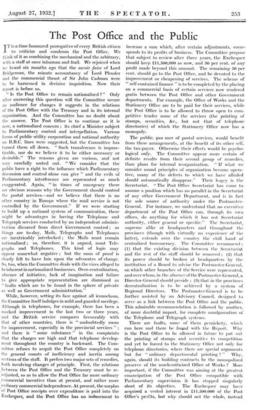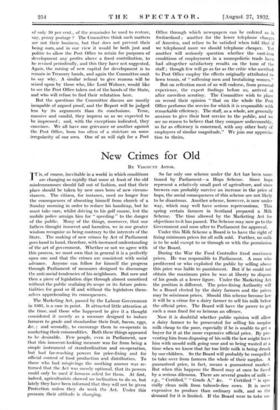The Post Office and the Public
IT is a time-honoured prerogative of every British citizen to criticize and condemn the Post Office. We think of it as combining the mechanical and the arbitrary, with a staff at once inhuman and frail. We rejoiced when we heard six months ago that the savoir faire of Lord Bridgemac, the minute accountancy of Lord Plender and the commercial thrust of Sir John Cadman were to be harnessed in decisive inquisition. Now their report is before us.
" Is the Post Office to remain nationalized " Only after answering this question will the Committee secure an audience for changes it suggests in the relations of the Post Office with the Treasury and in its internal organization. And the Committee has no doubt about the answer. The Post Office is to continue as it is now, a nationalized concern ; its chief a Minister subject to Parliamentary control and interpellation. Various forms of public utility corporation and national authority on B.B.C. lines were suggested, but the Committee has turned them all down. " Such transference is imprac- ticable, nor do we believe it to be either necessary or desirable." The reasons given are various,- and not very carefully sorted out. " We consider that the public have a right to the influence which Parliamentary discussion and control alone can give " and the evils of Parliamentary interference are represented as much exaggerated. Again, " in times of emergency there are obvious reasons why the Government should control the postal services—and we believe that there is no other country in Europe where the mail service is not controlled by the Government." If we were starting to build up a national system of communication, there might be advantages in having the Telephone and Telegraph services conducted by an independent adminis- tration divorced from direct Government control ; as things are to-day, Mails, Telegraphs and Telephones arc inextricably interlocked ; the Mails must remain nationalized ; so, therefore, it is argued, must Tele- graphs and Telephones. This kind of logic may appear somewhat negative ; but the onus of proof is clearly felt to have lain upon the advocates of change. So, too, when the Committee deals with the vices alleged to be inherent in nationalized businesses. Over-centralization, absence of initiative, lack of imagination and failure to give appropriate representation are dismissed as " faults which are to be found in the sphere of private as well as Government administration."
While, however, setting its face against all iconoclasm, the Committee itself indulges in mild and guarded sacrilege. Although in telephones, for example, there has been a marked improvement in the last two or three years, and the British service compares favourably with that of other countries, there is " undoubtedly room for improvement; especially in the provincial services " ; and there is " some substance " in the complaints that the charges are high and that telephone develop- ment throughout the country is backward. The Com- mittee refuses to acquit the Post Office completely on the general counts of inefficiency and inertia among sections of the staff. It prefers two major sets of remedies, both involving changes of principle. First, the relations between the Post Office and the Treasury must be re- adjusted, so as to allow the Post Office far more ordinary tcommercial incentive than at present, and rather more ,ordinary commercial independence. At present, the surplus of Post Office receipts over expenditure is paid into the Exchequer, and the Post Office has no inducement to increase a sum which, after certain adjustments, corre-- sponds to its profits of business. The Committee propose that subject to review after three years, the Exchequer should keep £11,500,000 as now, and 50 per cent. of any profit made beyond this amount. The remaining 50 per cent. should go to the Post Office, and be devoted to the improvement or cheapening of services. The scheme of " self-contained finance " is to be completed by the placing on a commercial basis of certain services now rendered gratis between the Post Office and other Government departments. For example, the Office of Works and the Stationery Office are to be paid for their services, while the Post Office is to be allowed to throw open to com- petitive tender some of the services (the printing of stamps, securities, &c., but not that of telephone directories) of which the Stationery Office now has a monopoly.
The public, qua user of postal services, would benefit from these arrangements, at the benefit of its other self, the tax-payer. Otherwise their effects would be psycho- logical only. The Committee appear more certain of definite results from their second group of remedies, than plans for internal reorganization. " If what we consider sound principles of organization become opera- tive, many of the defects to which we have alluded should automatically disappear." Their bogey is the Secretariat. " The Post Office Secretariat has come to assume a position which has no parallel in the Secretariat of any other Government Department, and is in fact the sole source of authority under the Postmaster- General. For instance, we understand that no executive department of the Post Office can, through its own offices, do anything for which it has not Secretariat authority, either general or specific." The Secretariat, supreme alike at headquarters and throughout the provinces (though with virtually no experience of the latter), extends over the country the chill hand of centralized bureaucracy. The Committee recommend : (1) that the existing division between the Secretariat and the rest of the staff should be removed ; (2) that its power should be broken at headquarters by the institution of a Board to advise the Postmaster-General, on which other branches of the Service were represented, and over whom, in the absence of the Postmaster-General, a Director-General should preside ; (8) that in the provinces decentralization is to be achieved by a system of Regional Directors. The Postmaster-General is to be further assisted by an Advisory Council, designed to serve as a link between the Post Office and the public. This admirable recommendation is followed by another, of more doubtful import, for complete amalgamation of the Telephone and Telegraph systems.
There are faults, some of them pernickety, which can here and there be found with the Report. Why is the Post Office to be allowed in future to put out the printing of stamps and securities to competition and yet be forced to the Stationery Office not only for telephone directories, where there are special arguments but for " ordinary departmental printing " Why, again, should its building contracts be the monopolized preserve of the much-criticized Office of Works ? More important, if the Committee was aiming at the greatest emancipation of the Post Office compatible with Parliamentary supervision it has stopped singularly short of its objective. The Exchequer may have acquired a vested interest in £11,500,000 of the Post Office's profits, but why should not the whole, instead of only 50 per cent., of the remainder be used to restore, say, penny postage ? The Committee think such matters are not their business, but that does not prevent their being ours, and in our view it would be both just and politic to allow the Post Office to retain for purposes of development any profits above a fixed contribution, to be revised periodically, and this they have not suggested.. Again, the raising of new capital for development is to remain in Treasury hands, and again the Committee omit to say why. A similar refusal to give reasons will be seized upon by those who, like Lord Wolmer, would like- to see the Post Office taken out of the hands of the State, and who will refuse to find their refutation here.
But the questions the Committee discuss are mostly incapable of argued proof, and the Report will be judged less by its arguments than its conclusions. Terse, massive and candid, they impress us as we expected to be impressed ; and, with the exceptions indicated, they convince. We all have one grievance or another against the Post Office, born too often of a stricture on some irregularity of our own. One of us will sigh for a Post Office through which newspapers can be ordered as in Switzerland ; another for the lower telephone charge, of America, and refuse to be satisfied when told that if we telephoned more we should telephone cheaper. Yet another will seriously question whether the cast-iron conditions of employment in a monopolistic trade have had altogether satisfactory results on the tone of the staff ; though few will go as far as the critic who ascribed to Post Office employ the effects originally attributed to lawn tennis, of " softening men and brutalizing women."
But on reflection most of us will endorse, from personal experience, the expert findings before us, arrived at after merciless scrutiny. The Committee wish to place on record their opinion " that on the whole the Post Office performs the service for which it is responsible with remarkable efficiency. The staff, as a whole, are generally anxious to give their best service to the public, and we see no reason to believe that they compare unfavourably, so far as efficiency is concerned, with any other body of employees of similar magnitude." We join our apprecia- tion to theirs.



























 Previous page
Previous page